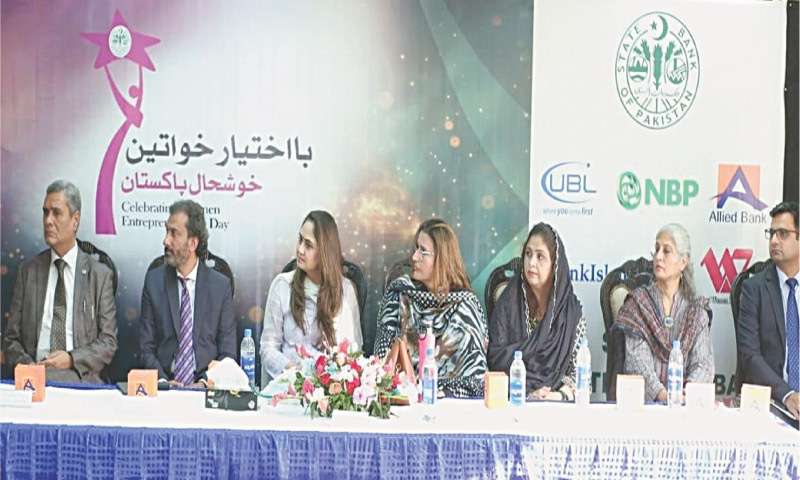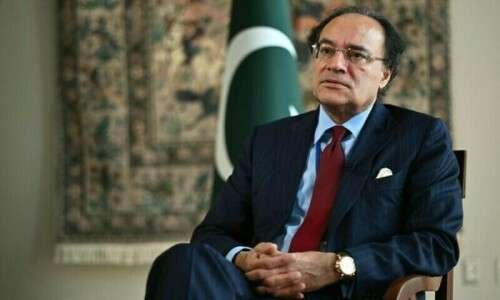In an inspiring and thought-provoking event at the State Bank of Pakistan (SBP), women leaders gathered to celebrate Women’s Entrepreneurship Day. The event, held at the SBP’s Banking Services Corporation in North Nazimabad, brought together women from all walks of life to share their success stories and offer invaluable lessons on financial independence, entrepreneurship, and resilience. The event’s timing was symbolic, coinciding with International Men’s Day on November 19, offering a unique platform to discuss the challenges and triumphs of female entrepreneurs in Pakistan.
Breaking Stereotypes: The Importance of Financial Independence
Zanjabeel Asim Shah, a renowned screenwriter and one of the event’s key speakers, sparked an important conversation when she boldly declared, “Don’t marry off your girls till they are financially independent.” This statement challenged deep-rooted societal norms where daughters are often raised with the belief that their future security lies in marriage, while sons are encouraged to pursue careers. Shah’s personal journey from a life of comfort to one of responsibility after her husband’s cancer diagnosis highlighted the significance of financial independence for women. When faced with sudden adversity, she was forced to learn not only how to manage household affairs but also how to take charge of her family’s financial matters. This experience eventually led to her career as a screenwriter, a role that enabled her to support her family and thrive independently.
Her powerful message underscored the need for women to take control of their finances and not depend on others for their economic security. Shah’s own transformation reflects the broader importance of equipping women with financial knowledge and independence, empowering them to become resilient, self-sufficient individuals in all spheres of life.
The Challenge of Financial Empowerment for Women Entrepreneurs
Despite significant strides made by women in entrepreneurship, statistics still reveal a concerning disparity between male and female participation in Pakistan’s financial ecosystem. According to the State Bank of Pakistan (SBP), women constitute nearly half of the population but represent less than 10% of total borrowers. Additionally, only 26% of bank account holders are women. However, as revealed by Mahin Sahibzadi, the founder and president of the Women Chamber of Commerce & Industry in Korangi, these statistics do not paint the full picture. During the event, Sahibzadi conducted a simple yet revealing exercise by asking how many women in the audience owned a bank account. While many hands went up, significantly fewer remained raised when the question shifted to how many managed their accounts independently, without the involvement of male family members.
This exercise served to highlight the subtle but pervasive gender biases that still influence women’s financial autonomy. Although many women are actively running successful businesses, financial management is often delegated to male family members due to the misconception that women are not adept at handling financial matters. This dependency can have dire consequences, particularly when personal relationships, such as marriages, break down. Without control over the financial aspect of their business, women can find themselves without a safety net, resulting in the collapse of their enterprises.
Women Entrepreneurs: Overcoming Social and Cultural Barriers
The event also shed light on the social and cultural barriers that female entrepreneurs face. One key challenge is the lack of networking opportunities. While male entrepreneurs often benefit from informal gatherings, lunches, and social meetups that facilitate the exchange of ideas and opportunities, women are often burdened with household duties, childcare responsibilities, and societal expectations. This imbalance leaves women with fewer chances to connect with peers, mentors, and investors, hindering their professional growth.
In her address, Sahibzadi emphasized the importance of women supporting each other through collaborations and networking. Drawing inspiration from the #BehenCode from the Amazon Prime series Call Me Bae, she urged women to build strong communities and alliances to collectively uplift one another. This call for unity and shared success resonates with the broader movement toward empowering women, not only through individual achievements but also through collaborative efforts.
Positive Signs: Financial Support for Women Entrepreneurs
While the challenges remain significant, there are positive signs that the financial landscape for women entrepreneurs is gradually improving. The SBP highlighted that, from July to November 2023, banks in Pakistan disbursed approximately Rs24 billion to more than 20,000 women-led businesses. This figure represents a notable effort by financial institutions to support women’s entrepreneurship, although it still falls short when compared to the overall credit disbursed in the country. Women received only 4.4% of total credit, though this figure rises to 9% when considering small and medium-sized enterprises (SMEs). Among the 176,000 SMEs in Pakistan, fewer than 5% are led by women, underscoring the urgent need for more targeted support for female entrepreneurs.
The low percentage of women-led businesses in Pakistan reveals that, while there is an increasing recognition of women’s potential in the business world, there are still numerous barriers that prevent women from accessing the financial resources and opportunities they need to succeed. These barriers are not limited to financial constraints but also include cultural attitudes and institutional biases that need to be addressed if women’s full potential is to be realized.
The Role of Women in Traditional Industries
One inspiring example showcased at the SBP event was the presence of women who are breaking barriers in traditionally male-dominated industries. From handicrafts and jewelry to medical aids and textile manufacturing, female entrepreneurs are not only succeeding in business but are also carving out niches in sectors where women have traditionally been underrepresented. One notable example is the Cut-Measure-Trim (CMT) providers—female-led businesses that take on overflow work from larger textile firms, competing in an industry known for its grueling hours and intense competition. These women are pushing the boundaries of what is possible for women in Pakistan, showing that with determination and resilience, they can thrive in even the most challenging environments.
The Road Ahead: Financial Literacy and Gender Equality
The event concluded with a call to action for increasing financial literacy among women and fostering an environment where female entrepreneurs can flourish. The key takeaway was that empowerment without understanding and actively participating in financial matters is incomplete. Women must not only have access to capital but also the knowledge and skills necessary to manage it effectively. Financial literacy, coupled with mentorship and access to networks, is essential for women to succeed in today’s competitive business environment.
FAQs
1. How can women improve their financial independence?
Women can improve financial independence by gaining financial literacy, seeking out professional advice, and managing their own financial affairs without relying on family members or spouses. Building savings, investing, and managing a budget are key steps toward financial autonomy.
2. What challenges do female entrepreneurs face in Pakistan?
Female entrepreneurs in Pakistan face several challenges, including limited access to finance, social and cultural biases, and a lack of networking opportunities. Many women are also burdened with household responsibilities, which can make it difficult to focus on their businesses.
3. What is the significance of networking for female entrepreneurs?
Networking is crucial for female entrepreneurs as it allows them to connect with potential partners, clients, mentors, and investors. However, due to societal expectations, women often have fewer opportunities to network compared to men.
4. How is the State Bank of Pakistan supporting women entrepreneurs?
The State Bank of Pakistan has introduced initiatives to support women entrepreneurs, including the disbursement of loans to women-led businesses. In 2023, around Rs24 billion was disbursed to over 20,000 women-led businesses to help them grow and succeed.
5. What role do women play in traditionally male-dominated industries?
Women are increasingly taking on leadership roles in traditionally male-dominated industries, such as textile manufacturing, handicrafts, and jewelry. By breaking barriers and excelling in these sectors, women are challenging societal norms and proving their capability in diverse fields.
Conclusion
The SBP event was a powerful reminder of the resilience and determination of women entrepreneurs in Pakistan. While challenges remain, the increasing support from financial institutions, combined with the efforts of women to network and collaborate, is paving the way for a more inclusive and empowered future. The event highlighted that financial independence is key to women’s empowerment, and that true equality can only be achieved when women have the knowledge, resources, and opportunities to thrive.
SEE ALSO:
https://flarenews.pk/2024/11/20/shahid-aslam-appointed-as-pakistans-batting-coach/


